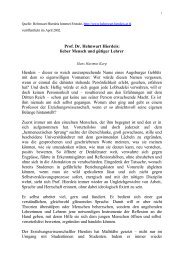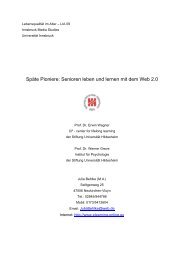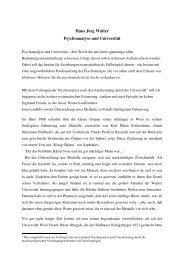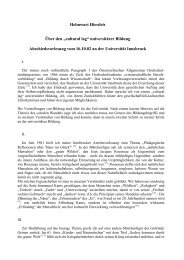Download pdf - Universität Innsbruck
Download pdf - Universität Innsbruck
Download pdf - Universität Innsbruck
Sie wollen auch ein ePaper? Erhöhen Sie die Reichweite Ihrer Titel.
YUMPU macht aus Druck-PDFs automatisch weboptimierte ePaper, die Google liebt.
40 Katharine Sarikakis<br />
come as these may be, they do come with some considerable delay, given the track record<br />
of SNS and their continuing approach to privacy, at regular intervals. Moreover, these<br />
initiatives are the outcome of compromises between pressures for the updating of legal<br />
frameworks (with regards to human rights and right to privacy) and those for abandoning<br />
interventions in the processes of the SNS market.<br />
Social media push the boundaries of privacy, not in favour of something new replacing<br />
older or outdated provisions or on the basis of ‘public demand’, but in favour of a system<br />
that poses no restrictions on social media companies themselves. The ability to collect,<br />
monitor, manipulate and then pass on data to third commercial and state parties through<br />
‘leisure’ is probably a grand act of manipulation. Copyright and ownership are two separate<br />
areas of policy that come together in social media sharing. Human connection in this<br />
form (holiday pictures, ‘mood statements’, files, information on others, maps etc) is not<br />
named labour, because it occupies the spaces between production and consumption.<br />
Moreover, it takes place on the basis of ‘free will’ and consensus, and under such conditions<br />
whereby private communication traffic channels assign copyrighted properties to<br />
until now non-copyrighted materials. Users have no knowledge of or control over when,<br />
how often, to what extent and purposes their personal information is ‘shared’ with third<br />
parties. Applications run by ‘developers’ on Facebook have access to personal information,<br />
violating this way the ‘least authority’ design principle. These are all specific,<br />
technologically enabled and purpose tailored tactics within which the law is challenged to<br />
engage. Given the timeframes within which policy processes take place and the speedy<br />
changes companies such as this operate with, it is doubtful whether laws will have any<br />
long lasting effect on Facebook. It is at this point where the gaps in policy leave users and<br />
citizens navigating through the enticing promises of borderlessness at a price: not only<br />
does information constitute the monetised exchange unit, but it becomes also the foundation<br />
of a future, where, forming the basis of privacy, it erodes the right to privacy as outdated<br />
and anachronistic. In such a future, past lives will haunt and colour new beginnings<br />
contributing decisively to social sorting and profiling. The need to be able and ‘introduce’<br />
one’s self afresh, the right to anonymity, as well as the ‘right’ to be forgotten, to change<br />
one’s mind, to start again will turn impossible to maintain and pursue.<br />
3. Reflections on sharing on social media as labour and control<br />
The context of the internet is conducive to acts of sharing- as both internet and sharing are<br />
based on the understanding of ‘freedom’ to association and the enhanced active presence<br />
of the parties involved. Whether seen predominantly in the form of participatory culture<br />
(Jenkins, 2006) or generative technology (Zittrain, 2008), and certainly in most cases as a<br />
hybrid of both, the internet has facilitated and allowed for the broadest possible involvement<br />
of people in constructing, creating, configuring and controlling (its) content. This<br />
form of cultural and market value, the polymorphic production and distribution of new
















